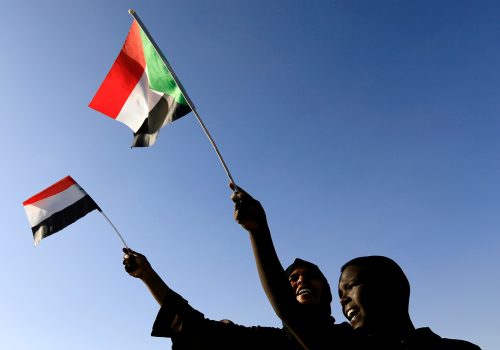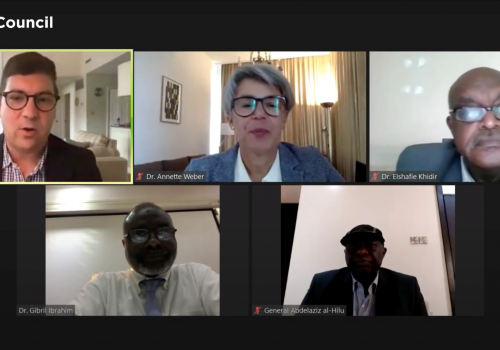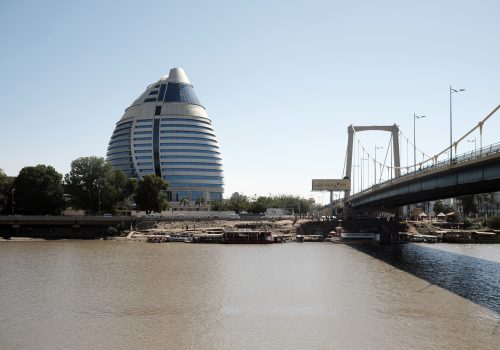A no strings attached policy toward Sudan
Secretary Pompeo’s stopover in Sudan last week marked another momentous step forward in the rapidly warming bilateral relationship between Sudan and the United States—the first visit to Sudan’s capital, Khartoum, by a US Secretary of State in fifteen years. Unlike Condoleezza Rice’s stopover in 2005, aimed at heaping pressure and opprobrium on the country’s then-autocratic ruler, Omar al-Bashir, for unleashing hell in Sudan’s far-western Darfur region, Pompeo’s stop, on its surface, appeared intended to confer praise and legitimacy on the year-old, civilian-led transitional government. Upon reflection, it will hopefully be looked back upon as the penultimate step in Sudan’s multidecade-long journey to be removed from the US State Sponsor of Terrorism List.
As much as there remains obstacles to Sudan’s ultimate de-listing, coming primarily from victim groups of Sudan’s past terror-related crimes and their allies in Congress, the tenor and substance of the conversation in Washington around Sudan has fundamentally changed this year. Reduced, though not eliminated, are the doubts that recidivist military and Islamist factions are waiting in the wings to overthrow or undermine civilian rule as soon as Washington’s ultimate sanction is removed. Indeed, prior to Pompeo’s visit, Washington had seemed to finally recognize that the best way to weaken the potential spoilers in Sudan is to bet big on civilian leaders and the transitional government. Sudan’s removal from the terror list had begun to no longer appear a question of whether it should happen, but rather how and when it will happen. Sadly, Pompeo’s visit last week did little to provide needed responses to these questions.
To his credit, Pompeo has invested some precious diplomatic capital in his relationship with Sudan and its affable Prime Minister, Abdalla Hamdok. The historic and highly successful visit of Hamdok to Washington last December, which Pompeo missed due to his own travel, was followed up by the briefest of exchanges between them on the margins of the Munich Security Conference in February. However, through a series of regular phone calls, Pompeo has followed the positive reform efforts out of Sudan and the country’s multiple efforts to resolve terror claims against it, implement painful economic reforms, and work with the country’s military to present a united front through the transition. Following each call, Pompeo has sounded the right tone in his tweets and press statements, taking great care to repeatedly praise “the civilian-led transitional government.”
This all led to Pompeo’s historic trip this week and the something of a surprise outcome where the topic of Israel’s normalization of relations with Sudan emerged as the big ask by the United States and what some now fear is a new requirement for Sudan’s removal from the terror list. After all, since the Chairman of Sudan’s Sovereignty Council, General Abdel Fattah al-Burhan, made the first secret contact with Israeli Prime Minister Netanyahu in February (a meeting explicitly encouraged by Pompeo in a call with Burhan), many in the Trump foreign policy orbit have been tempted by the notion that Sudan could move from terrorist state to friend of Israel with the guided hand of Washington.
When the United Arab Emirates (UAE) announced earlier this month that it had achieved a historic peace deal with Israel with the help of Washington, it breathed new life into the Administration’s Middle East peace proposal, which had seemingly been languishing for months. It also lit a fire under Pompeo and his team that they had a limited window to replicate the UAE success with other Arab states. Pompeo’s hastily announced Middle East tour this week appears to have been an effort to do just that.
But by adding Sudan to the list of other Arab stops, like Bahrain and Oman, the established logic behind removing Sudan from the terror list began to morph as well. No longer does de-listing appear to be part of the US leverage to further encourage and support the transitional government and their efforts to reform and transform the Sudanese state. Instead, de-listing seemingly has become the leverage to achieve a Middle East foreign policy coup in the waning days before the November election.
On its surface, it is perhaps understandable that Pompeo’s team saw this as a win-win. After all, Sudan has been clear that its top priority with Washington is being removed from the terror list and it has demonstrated a willingness to do almost anything to satisfy Washington’s demands; namely, settling the terror-related legal judgments against it. Sudan has done this, reportedly scraping together nearly $350 million to be distributed to American and African victims of the US Embassy bombings in Kenya and Tanzania. Sudan’s civilian leaders have also repeatedly emphasized their intention to establish a “balanced foreign policy” and deepen their relations with established democracies. Viewed from Washington, what better example of both and demonstration that Sudan truly belongs off the terror list than normalizing relations with the Middle East’s only true democracy?
But in their haste to get something for nothing, Pompeo and his team ignored both the deep sensitivities in Sudan around the United States seemingly “moving the goalposts” on sanctions removal, but perhaps more importantly, the very fragile state of the transition in Sudan that SST removal is ostensibly intended to support. As much as both Hamdok and Pompeo have sought to rebuild relations based upon mutual respect, distrust and misunderstanding in official bilateral relations still run deep. From the US bombing of the al-Shifa pharmaceutical plant outside Khartoum in 1998 to US support for South Sudanese independence in 2011, US policy is still viewed by many as not just anti-Bashir, but anti-Sudan.
But beyond the reputational deficit the United States faces, pressing for normalized relations with Israel, a country which an entire generation of politicians in Sudan swore to never “recognize, cooperate, or negotiate with,” belies Pompeo’s repeated claims that US policy now seeks to strengthen the bonds of the transitional government and promote productive relations between its military and civilian wings. Indeed, the request completely ignored the fragile moment the transitional government is in. With the Forces of Freedom and Change officially split on relations with Israel and with civilian leaders facing their harshest criticism yet from internal constituencies whose patience is running low one year into a transition that has yet to see institutionalized political reform or the beginnings of an economic recovery, now is not the moment to introduce such a politically charged issue into Sudan’s body politic.
Importantly too, the request also risks undermining the very delicate balance of power that exists between military and civilian leaders. In the end, security and intelligence forces would likely be the first and most significant beneficiaries of Israeli largesse through improved access to intelligence and defense equipment (like sought-after Israeli software for cracking the WhatsApp messaging platform), training, and information sharing. Meanwhile, civilians would be left to manage the plight of more than 30,000 Sudanese refugees stranded in Israel that Tel Aviv has been anxious to see repatriated, but who would only add to Sudan’s internal economic burden.
In the end, Sudan appears to have escaped a moment of reckoning as both civilian and military leaders rebuffed Pompeo’s Hail Mary. But the normalization issue has not gone away and is likely to re-emerge before the November Presidential elections in the United States. With an invitation to Sudan to attend an upcoming and ill-defined Middle East Peace Summit somewhere in the region, pressure will remain on Sudan to quicken its rapprochement with Israel. Washington, in turn, could choose to slow roll the final administrative steps needed to remove Sudan from the terror list in a last bid effort to pluck what it thinks is low hanging fruit in Khartoum. There is, however, a middle ground.
It remains in Sudan’s interest to explore a relationship with Israel, to allow it to be debated publicly, and to explore a broader potential set of benefits in areas like development, investment, and trade that would benefit all Sudanese. A visit by Hamdok to Tel Aviv to initiate that discussion could deliver high symbolic value and demonstrate good faith to interested US audiences but would come at reduced political cost to the transition domestically. Trade delegations, student exchanges, and cooperative arrangements in public health are some intermediate steps that could ultimately test the potential of improved relations without crossing the point of no return that normalization represents.
For its part, Washington should not hesitate in its privately stated commitment to remove Sudan’s terror label. There is still work to be done to engage Congress around outstanding issues regarding restoring Sudan’s sovereign immunity and providing it “legal peace,” which would importantly ensure that it could not be held liable for any additional terror-related lawsuits. These talks will take time and could well involve political bargaining in Washington—at a moment when US bipartisanship is ebbing. Delaying further, in the hopes of driving Sudan into the arms of a domestically fraught suitor like Israel, would ignore the fragility of the moment Sudan is in and undervalue the important changes that have already occurred.
Cameron Hudson is a senior fellow at the Atlantic Council’s Africa Center. Previously he served as the chief of staff to the special envoy for Sudan and as director for African Affairs on the National Security Council in the George W. Bush administration. Follow him on Twitter @_hudsonc.
Image: US Secretary of State Mike Pompeo meets with Sudanese Prime Minister Abdalla Hamdok. (Twitter/Secretary Pompeo)


